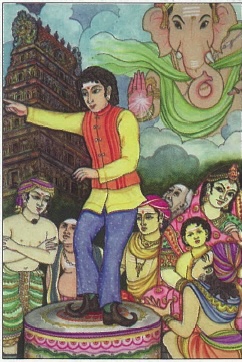By the Editors
What would seem to be, at first glance, a relatively simple question with a quick answer: Hindus speak for Hindus. If proof is needed, then one could commission a poll to ask a cross-section of Hindus who speaks for them. But a series of articles on this very question appearing in the December issue of the Journal of the American Academy of Religion eschews this empirical approach. Twelve scholars of Hinduism three of them practicing Hindus attempt to answer this question by methodical analysis. None can be said to successfully respond to the question, but their analysis is a revealing glimpse into the academic world and its view of religion in general and Hinduism in particular. The hundred-plus pages of articles are a difficult read. The scholars prefer complex sentences and unusual uses of words. The result strikes one as almost a special language intended only for communicating with other scholars, even though the subject matter is of interest and importance well beyond their relatively small circle.
The articles take us on a fascinating tour of Hindu academics in America. Right off, we learn from Dr. Sarah Caldwell and Dr. Brian Smith that the question of who speaks for a religion is not at all confined to Hinduism, but has been debated within Judaism, Islam, Catholicism and Buddhism as well. Then they introduce what may well be the key issue, “the perspective of the ‘insider’ versus that of the ‘outsider.'” It is not at all a given, we learn in this and other articles, that the adherent to a religion is necessarily, from the scholastic point of view, the proper person to speak for the religion. They go on to characterize as a “tightrope between academic and religious worlds of value” the situation of a scholar who has immersed himself in a religious tradition to the point of becoming an “insider.”
One might wonder why this is an issue, and what could be wrong with being an “insider.” Some of the papers discuss the issue of objectivity, with the implication that objectivity is best obtained by standing outside the religion. This same subtext continues throughout the papers: that there is something amiss with being a believer. In fact, several writers were very much on the defensive about the depths of their own involvement with Hinduism and the extent to which it impacted their objectivity.
By chance, the article following this set of twelve on Hinduism in the AAR journal is, “On Sublimation: The Significance of the Psychoanalysis for the Study of Religion” by Dr. Clayton Crockett. In it we find this statement, “For orthodox Freudianism, religious feeling is an illusion that then becomes a collective delusion when humans objectify and worship the source of this feeling.” Or, as Freud himself put it, “[Religion is] a system of wishful illusions together with a disavowal of reality, such as we find nowhere else but in amentia.” Amentia means “insufficient mental development.” None of the twelve authors addressing the question of “Who Speaks for Hinduism” explicitly endorses Freud’s view though the paper by Crockett is a plea to include more of Freud in the study of religion. But throughout the writings on Hinduism, one can’t escape the feeling that Freud’s view of religion is, in fact, the accepted framework within which academic study takes place.
What then should Hindus make of a scholastic enterprise which regards religious experience as “wishful illusion” and “disavowal of reality”? Hindus readily accept as reality transcendental realms of Gods and devas and higher modes of consciousness than that in which we commonly live. To the Hindu, who best speaks for Hinduism is more likely to be answered in terms of expanded awareness, attainment of refined consciousness and even communication with the Gods. But when all this is dismissed as “amentia,” we are left only with evaluating who has the most accurate intellectual knowledge of Hinduism, and not who can speak out from a greater vision of truth. Similarly, the Pope won’t be able to speak for Catholicism, even though Catholics think he does, nor the Dalai Lama for Tibetan Buddhism, nor any other religious leader who claims transcendental knowledge.
Some of the scholars touch on this issue. Dr. William Harmen states, “Scholars of religion have a special responsibility when we speak of religious traditions to which we do not belong. We must represent what we find there, but because we have chosen for one reason or another not to be participants in that tradition, we cannot credibly dictate how that tradition should function.”
There was one very practical matter raised in the articles. Rachel Fell McDermott stated, “Will South Asian studies go the way of Jewish studies or African American studies, where to teach the subject one needs the right politics, origin and blood?” According to a survey by Rajiv Malhotra, who brought this AAR series of articles to our attention (seewww.infinityfoundation.com/ECITeducationframeset.htmfor his analysis), in Western academia, 100 percent of scholars of Jewish studies are Jews, 90 percent of scholars of Christian studies are Christians and over 70 percent of scholars of Buddhist are practicing Buddhists. However, at the moment, less than 20 percent of Hindu study scholars are practicing Hindus. One reason is that so few Hindus are inclined toward this field. Another is, amazingly enough, that there is no Hindu religious study department in any Indian university, not even in Banaras Hindu University, leaving Western universities the only place to qualify a scholar. Perhaps Hindus can follow the lead of the Jews and African Americans and ultimately build a significant presence in the academic community of religious scholars.
